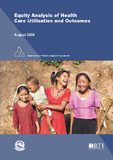Please use this identifier to cite or link to this item:
https://hdl.handle.net/20.500.14356/728Full metadata record
| DC Field | Value | Language |
|---|---|---|
| dc.contributor.author | Ministry of Health and Population | - |
| dc.date.accessioned | 2013-08-20T21:45:27Z | - |
| dc.date.accessioned | 2022-11-08T10:19:09Z | - |
| dc.date.available | 2013-08-20T21:45:27Z | - |
| dc.date.available | 2022-11-08T10:19:09Z | - |
| dc.date.issued | 2008 | - |
| dc.identifier.uri | http://103.69.126.140:8080/handle/20.500.14356/728 | - |
| dc.description.abstract | Executive Summary: With the Government of Nepal’s adoption of a targeted health care policy that seeks to assist those most in need of support, it has become necessary to have a better understanding of who exactly that is. While past surveys and studies have lent some insight into inequity, there is virtually no information on the trends of health care service utilisation and outcomes acrosscastes/ethnicities and income groups. Using the national demographic health surveys from 1996, 2001, and 2006, the data were analysed to reveal the trends in health service utilisation and outcomes over the last decade in specific areas indicative of health care provision: family planning, maternal health, child health, under-five, infant and neonatal mortality, and birth weight or size at birth. Unequal access and utilisation have decreased significantly for some services and health outcomes have improved. However, not all citizens of Nepal have equal access to health centres or routinely scheduled services. Between 1996 and 2006, differences between castes, ethnicities, and wealth quintiles decreased in contraceptive use, childhood immunisation, diarrhoeal disease control, and treatment for acute respiratory infection. Differences in underfive and infant mortality rates between castes, ethnic groups and wealth quintiles decreased. Disparities between castes, ethnic groups, and wealth quintiles in birth weight or size at birth have also diminished. However, disparities increased in antenatal care and deliveries attended by skilled birth attendants. At the same time, differences in neonatal mortality rates between Brahmins/Chhetris and Dalits, and between Newars and Janajatis have increased. | en_US |
| dc.language.iso | en_US | en_US |
| dc.publisher | Ministry of Health and Population | en_US |
| dc.subject | Health Care Utilization | en_US |
| dc.subject | Caste/Ethnic | en_US |
| dc.title | Equity analysis of health care utilization and outcomes: Trend analysis of inequality by wealth quintile and caste/ethnic group from 1996 to 2006 | en_US |
| dc.type | Technical Report | en_US |
| Appears in Collections: | NHRC Research Report | |
Files in This Item:
| File | Description | Size | Format | |
|---|---|---|---|---|
| 689.pdf | Full Report. Download | 1.49 MB | Adobe PDF |  View/Open |
Items in DSpace are protected by copyright, with all rights reserved, unless otherwise indicated.
